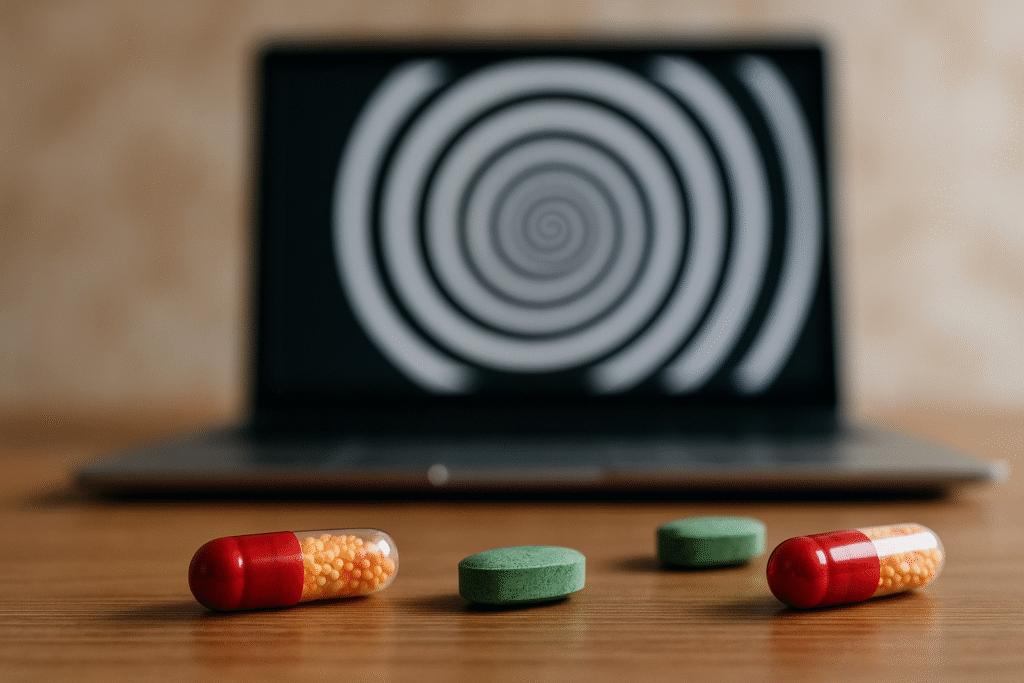Welcome back. Today we’re talking about the Placebo effect. Over the years we’ve heard many people say that hypnosis is just placebo. However, while placebo may play a part in what we do, it is not the whole story. Let’s me explain….
What Is A Placebo?
The placebo effect occurs when an inactive substance or fake treatment has an effect on the symptom or treatment of a patient’s condition. Scientist have been investigating this phenomena since at least 1799. Research indicates it occurs in about 35% of people. (“The Powerful Placebo,” Henry Beecher, 1955.)
Placebos have documented effects on any number of maladies. Pain, asthma, stress, anxiety, depression, hypertension, arousal, dermatology, nausea/vomitting, and angina have all been affected by placebo affect. In fact, sometimes placebos produce effects stronger than the active drugs used to treat them (“Hypnosis and Placebos: Response Expectancy as a Mediator of Suggestion Effects,” Irving Kirsch, 1999.)
Is Hypnosis A Placebo?
The short answer is no.
Powerful effects occur with placebos. Hypnosis is often inaccurately associated with the effect. Some professionals would have you believe that our effects are merely due to our clients beliefs and expectations. However, while expectation is an important part of the process, hypnosis is not the same as placebo in terms of responsiveness, physiological effect, or administration.
Efficacy
Efficacy, or responsiveness, is critical from a practical standpoint. If it doesn’t work why would you do it right? Here alone there are significant differences between the two. Let’s take one study as an example. The study found that in normal to difficult hypnotic subjects the effectiveness of the hypnosis and the placebo corresponded respectively. However, those who were highly susceptible to hypnosis responded far better to the hypnotic suggestions than to the placebo. (“The nature of hypnotic analgesia and the placebo response to experimental pain,” McGlashan, Evans, & Orne, 1969).
In addition there is a further difference in responsiveness. Responses to hypnosis are notoriously trait-like where you can determine who may respond better to suggestions. This is in comparison to placebos where traits are unreliable. Across the board in these studies no identifiable trait could be identified in those who responded to the false treatment. There does not appear to be a “placebo reactor” comparable to the “hypnotizable subject.” (Kirsch, 1999.)
Essentially, placebo only works when you believe you are taking something that will fix the problem. I can’t tell you how many times, I’ve worked with clients who didn’t even believe they could be hypnotized or that it could work. A huge contrast in efficacy. Where placebo primarily relies on conscious belief, hypnosis works regardless of that so long as you are willing to listen and follow the hypnotists instructions. Sure, if you’re a more difficult subject, you may require more sessions. But even at that most clients only need three sessions. In fact, we’ve only had two clients who ever needed more than that.
Brain Activity
There are similarities between hypnosis and placebo brain activity during their use for analgesia for pain. Both phenomena activate the somatosensory cortex (touch and proprioception), insula, thalamus (relay for sensory information), anterior cingulate cortex (cognitive functions), and prefrontal cortex.
However, there are also many differences in the activity between hypnosis and placebo. In placebo, the decreased pain is associated with changes in the limbic system as well as the periaqueductal gray (pain) and the nucleus accumbens (reward system). In hypnosis the changes occur instead in the occipital cortex (visual information and basal ganglia (movement and other functions) (“Brain activity during pain relief using hypnosis and placebo treatments,” Svetlana Kierjanen, 2012.)
Now, I’m no brain chemistry specialist. If I was I could have explained all those parts without adding all the links to my new favorite neuro informational site. Regardless of that, theses differences in the parts of the brain where activity are occurring are important. If placebo and hypnosis were the same, those parts would be far more similar. There would be more overlap. This may be the most significant proof that hypnosis is not placebo.
Ethics
In my opinion, this is the most important way in which hypnosis is different from a placebo effect. Placebos require that the treatment be presented as a deception. The individual has to believe they are getting a evidence based treatment with trials and science behind it. Hence, why placebos are a bit controversial in the medical world.
In contrast, hypnosis requires no deception to be effective. It is a non-deceptive means of exploiting the therapeutic power of suggestions. A good hypnotist is upfront and explains exactly what they plan to do. And that honesty meant the world to me when I started out as a client. It is a large part of what drove me to this profession and made it my passion.
This alone is the biggest difference for me however. The idea of someone tricking me into change just infuriates me. Makes me angry. No one likes to be lied to. Or deceived. This is why people get squeamish about placebos in the medical world. If your normal doctor treated your depression with sugar pills that you paid for, you’d be pissed. Or at least I would.
A good hypnotist doesn’t have to lie to sell their product. Another thing that drove me to this professions. The proof is in the product. All you have to do is come in and do it. To have an open mind willing to absorb the instructions. That’s all it takes to get into trance. Sometimes getting the work done take a bit more. You have to find the exact problem, pinpoint a solution, and get your conscious mind out of the way. Which is why I always tell clients that they may, or may not need, as many sessions as I think it may take. And that’s okay.
What Now?
I’ll leave you with a quote from Voltaire:
“There is probably more cure in the doctor’s words than in many of the drugs he prescribes.”
If you are interesting in more interesting hypnosis articles. Check out all the information at Hoosier Hypnosis. We offer a variety of information about hypnosis, what it is, what you can do with it, and how powerful it can be to enact change. If you are ready for a change (without sugar pills or chemicals) call us for a free consultation.



